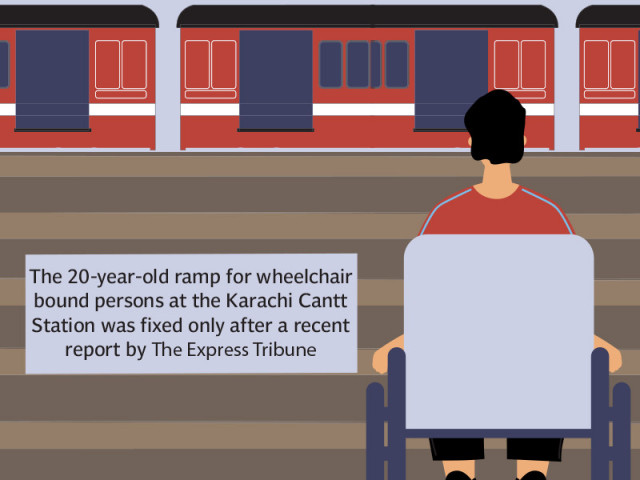Needs of disabled rail passengers ignored
No accessible infrastructure available at railway stations to meet their needs

A simple Google search for popular tourist spots in metropolitan cities across the country would include railway stations, which thanks to their colonial architecture and historical significance, allow travellers to take a trip down memory lane every time they board a train. Yet there is an unsaid catch to this time travel experience. The passenger must be capable of walking on two legs.
Built sometime around the late 19th century, railway platforms located in cities like Lahore, Karachi, Peshawar and Quetta, are a paramount mode of inter-city travel for those low-income families, who cannot afford to pay huge amounts as airfare.
However, despite catering to a large number of passengers on a regular basis, almost none of the major railway platforms across the country are accessible to passengers with restricted mobility, who in the dire absence of accessible infrastructure, facilities and wheelchairs, can never even imagine boarding a train, let alone exploring the ancient platforms, without seeking the assistance of a trusted loved one or a kind stranger.
For instance, Abdul Rehman, a wheelchair bound passenger traveling from Lahore to Rawalpindi, shared his challenging experience of boarding a train. "Since there were no ramps, the wheelchair couldn't board the train. My wife and I tried seeking help from someone but in the rush of the passengers, no one was willing to stop and lend a helping hand," regretted Rehman, who was almost stranded at the Lahore Station, where even the ticket counters were inaccessible for a person on a wheelchair.
Asma, another differently-abled passenger at the Lahore Station highlighted the lack of accessible facilities at the station. "There is no washroom specifically designed for special persons. The only option is the VIP washroom, which is exclusively for passengers travelling in air-conditioned classes," expressed Asma.
Commenting on the availability of wheelchairs, a porter at the station revealed that wheelchairs were indeed available but were often misplaced or moved around. "When a passenger offers to pay, a wheelchair can be arranged for them," shrugged the porter.
The situation was no less similar in Karachi, where Babli Naseem, a 58-year-old polio patient travelling to Rawalpindi to attend her niece's wedding, had to undergo a painful ordeal at the railway station. "Once I reached the platform, I realized that there were no special desks or ramps available for helping differently-abled persons like me. Hence, my brother and cousin had to lift me onto the train, which had no space for a wheelchair.
Miles up north in Peshawar, Umar Rana sympathised with Babli's plight since his own elderly mother with restricted mobility, faced the same issues while boarding a train to Lahore. "My mother cannot walk and hence she requires a wheelchair. Unfortunately, the Peshawar station has no ramps, and the only wheelchair available is extremely old," lamented Rana.
Shedding light on the condition of the toilets at the Peshawar station, Farooq Khan, who was traveling with his family to Attock, highlighted their lack of accessibility. "Most of the toilets are Indian-style, which are not suitable for disabled persons, offering them no ease or comfort. It is disgraceful that such a situation exists at a public facility," added Khan.
Unsurprisingly, the Quetta station presented the same challenges for differently-abled passengers in the absence of accessible infrastructure like ramps, wheelchairs, separate ticket counters, waiting areas and restrooms.
According to Dr Khalid Jameel Akhtar, an advocate for disability inclusion, people with disabilities, like everyone else, need to access public places like railway stations, airports, post offices, parks, and banks however, it was disheartening to realize that these spaces severely lacked accessibility arrangements. "At the Lahore station, almost no ramps are available and even when they do exist, they often require a person to take the stairs first." opined Dr Akhtar.
Concurring with Dr Akhtar, Chairman of the Railway Workers Union, Manzoor Razi, while commenting on the state of the Karachi Cantt Railway Station conceded to the claims that moving between platforms was a significant challenge for people on a wheelchair.
"The Karachi Cantt Station is the main railway station of Pakistan's largest city, Karachi, dating back to the British era when it was completed in 1898. Despite providing various facilities including a hospital, mosque and police station, there is a lack of facilities for differently-abled persons," observed Razi.
Speaking to The Express Tribune on the matter, a spokesperson for Pakistan Railways stated that wheelchairs were currently available at some major railway stations across the country, and ramps had also been installed at some places. "However, due to financial constraints, it is challenging to provide wheelchairs at every railway station," claimed the official.
With additional input from our correspondent in Quetta


1724319076-0/Untitled-design-(5)1724319076-0-208x130.webp)
















COMMENTS
Comments are moderated and generally will be posted if they are on-topic and not abusive.
For more information, please see our Comments FAQ